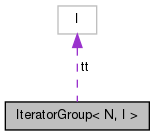
Public Member Functions | |
| IteratorGroup () | |
| IteratorGroup (const IteratorGroup< N, I > &g) | |
| void | operator= (const IteratorGroup< N, I > &g) |
| ~IteratorGroup () | |
| I & | operator() (unsigned i) |
| const I & | operator() (unsigned i) const |
Protected Attributes | |
| I | tt [N] |
| The actual iterators. | |
Related Functions | |
(Note that these are not member functions.) | |
| template<unsigned N, typename I > | |
| bool | operator< (const IteratorGroup< N, I > &a, const IteratorGroup< N, I > &b) |
| template<unsigned N, typename I > | |
| std::size_t | operator- (const IteratorGroup< N, I > &a, const IteratorGroup< N, I > &b) |
| template<unsigned N, typename I > | |
| void | advance (IteratorGroup< N, I > &t, const unsigned n) |
| template<unsigned N, typename I > | |
| void | advance_by_one (IteratorGroup< N, I > &t) |
| template<unsigned N, typename I > | |
| IteratorGroup< N, I > | operator+ (const IteratorGroup< N, I > &a, const std::size_t n) |
| template<unsigned N, typename I > | |
| IteratorGroup< N, I > | operator++ (IteratorGroup< N, I > &a) |
| template<unsigned N, typename I > | |
| bool | operator!= (const IteratorGroup< N, I > &a, const IteratorGroup< N, I > &b) |
Detailed Description
template<unsigned N, typename I>
class IteratorGroup< N, I >
This class basically keeps a group of iterators in sync. Since there is no way to know on how many subproblems a given problem might depend on, then we need to have a way to keep all the cell iterators in sync. The deal.II library has a similar capability, namelty, the SynchronousIterators class template. However, it allows for a maximum of four (4) grouped iteratos. A way around this is to parametrize the class with the number of iterators.
Definition at line 15 of file GroupedIterators.h.
Constructor & Destructor Documentation
| IteratorGroup< N, I >::IteratorGroup | ( | ) |
Does nothing.
Definition at line 47 of file GroupedIterators.h.
| IteratorGroup< N, I >::IteratorGroup | ( | const IteratorGroup< N, I > & | g | ) |
Copy the contents of each one of the iterators
Definition at line 49 of file GroupedIterators.h.
References IteratorGroup< N, I >::tt.
| IteratorGroup< N, I >::~IteratorGroup | ( | ) |
Does nothing
Definition at line 54 of file GroupedIterators.h.
Member Function Documentation
| void IteratorGroup< N, I >::operator= | ( | const IteratorGroup< N, I > & | g | ) | [inline] |
Copy operator
Definition at line 66 of file GroupedIterators.h.
References IteratorGroup< N, I >::tt.
| I & IteratorGroup< N, I >::operator() | ( | unsigned | i | ) | [inline] |
Access the content of the array of iterators
Definition at line 56 of file GroupedIterators.h.
References Assert, and ExcIndexRange().
| const I & IteratorGroup< N, I >::operator() | ( | unsigned | i | ) | const [inline] |
Access the content of the array of iterators as const
Definition at line 61 of file GroupedIterators.h.
References Assert, and ExcIndexRange().
Friends And Related Function Documentation
| bool operator< | ( | const IteratorGroup< N, I > & | a, |
| const IteratorGroup< N, I > & | b | ||
| ) | [related] |
Compares only the first iterators. After all they're supposed to be in sync all the time
Definition at line 74 of file GroupedIterators.h.
| std::size_t operator- | ( | const IteratorGroup< N, I > & | a, |
| const IteratorGroup< N, I > & | b | ||
| ) | [related] |
Returns the distance between two iterators
Definition at line 82 of file GroupedIterators.h.
References Assert, and ExcInternalError().
| void advance | ( | IteratorGroup< N, I > & | t, |
| const unsigned | n | ||
| ) | [related] |
advances all the iterators by n
Definition at line 92 of file GroupedIterators.h.
Referenced by IteratorGroup< N, I >::operator+().
| void advance_by_one | ( | IteratorGroup< N, I > & | t | ) | [related] |
advances all the iterators by one
Definition at line 100 of file GroupedIterators.h.
Referenced by IteratorGroup< N, I >::operator++().
| IteratorGroup< N, I > operator+ | ( | const IteratorGroup< N, I > & | a, |
| const std::size_t | n | ||
| ) | [related] |
maps to advance(a,n)
Definition at line 108 of file GroupedIterators.h.
References IteratorGroup< N, I >::advance().
| IteratorGroup< N, I > operator++ | ( | IteratorGroup< N, I > & | a | ) | [related] |
advances by one the argument
Definition at line 118 of file GroupedIterators.h.
References IteratorGroup< N, I >::advance_by_one().
| bool operator!= | ( | const IteratorGroup< N, I > & | a, |
| const IteratorGroup< N, I > & | b | ||
| ) | [related] |
comparison operator. Again, we only compare the first component
Definition at line 126 of file GroupedIterators.h.
Member Data Documentation
I IteratorGroup< N, I >::tt[N] [protected] |
The actual iterators.
Definition at line 44 of file GroupedIterators.h.
Referenced by IteratorGroup< N, I >::IteratorGroup(), and IteratorGroup< N, I >::operator=().
The documentation for this class was generated from the following file:
- /export/home/gkanscha/ANS/submissions/Salgado/include/GroupedIterators.h
 1.7.6.1
1.7.6.1